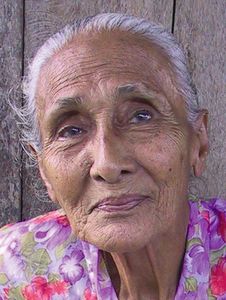 The Tidore people live on the island of Tidore in the North Maluku province. Tidore is one of the islands in the Maluku archipelago. The Maluku Islands have long been known as the “Spice Islands,” consisting of more than a thousand islands scattered throughout eastern Indonesia, including most of the islands between Sulawesi and Papua, and between Timor and the Philippines.
The Tidore people live on the island of Tidore in the North Maluku province. Tidore is one of the islands in the Maluku archipelago. The Maluku Islands have long been known as the “Spice Islands,” consisting of more than a thousand islands scattered throughout eastern Indonesia, including most of the islands between Sulawesi and Papua, and between Timor and the Philippines.
While many other ethnic groups inhabit Soa Siu, the capital city of Tidore, the Tidore people dominate the small villages spread throughout the island. In everyday conversation, the Tidore people use their own language, Tidore. They also understand Ternate, the language of their neighbors, which was once the trade language in the region.
Tidore people have a close connection with their neighbors, the Ternate. However, each group strongly maintains its distinct identity. Tidore people don’t like to be called Ternate, and vice versa. The Tidore language is part of a larger linguistic grouping called the North Halmahera which also includes the Laba, Waioli, and Ternate.
Formerly the Ternate had closer relationships with other ethnic groups from western Indonesia. Because of this, Tidore are sometimes considered less educated than the Ternate. But the Tidore people are more industrious than the Ternate.
What are their lives like?
Cultural observers divide the region of North Maluku and Halmahera into three cultural areas: Ternate, Tidore and Bacan. The Tidore area includes all of the islands in the area of Tidore and central and eastern Halmahera.
Most Tidore earn a living by farming, fishing, trading, or working for the government. They cultivate several crops, including rice, cassava and peanuts. They also grow cloves, coconut and cocao (chocolate).
The kinship system of the Tidore community is patrilineal; kinship is traced through one’s father. One important family group is the soa, or clan. Tidore tradition states that the ideal marriage is between first cousins. Newly married couples may live with either of their sets of parents.
What are their beliefs?
The Tidore are loyal followers of Islam. In the past, the Tidore sultanate was a central force behind the spread and development of Islam in Maluku. Every village has a mosque. Islamic religious teachers serve as informal leaders in Tidore communities.
What are their needs?
Although the Maluku Islands are rich in natural resources, especially marine resources, many of the inhabitants still live in poverty. Their economy needs stimulus through diversification of farming and fishing. One example would be the cultivation of fruit plants with high economic value.
The fishing industry also needs improvement. For better marketing of local products, transportation and communication infrastructure need enhancement. More medical clinics and personnel are also needed.
Leave a Reply